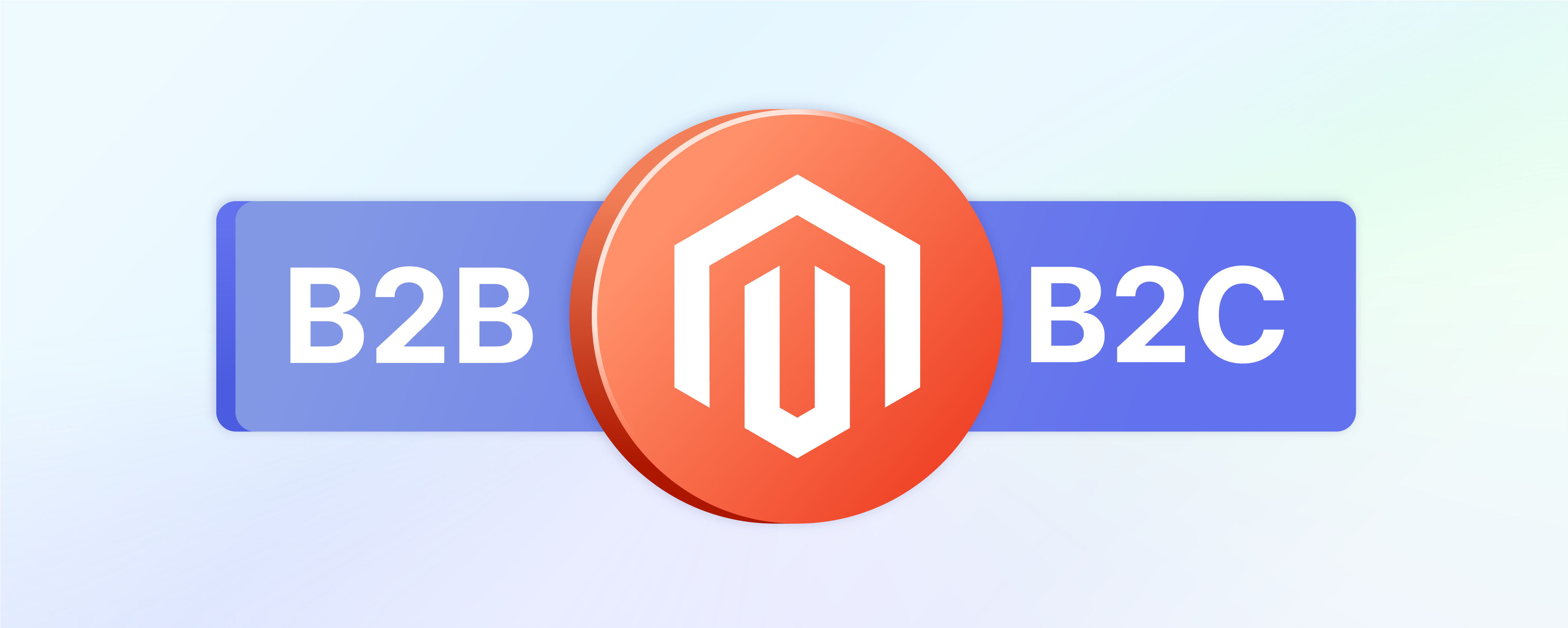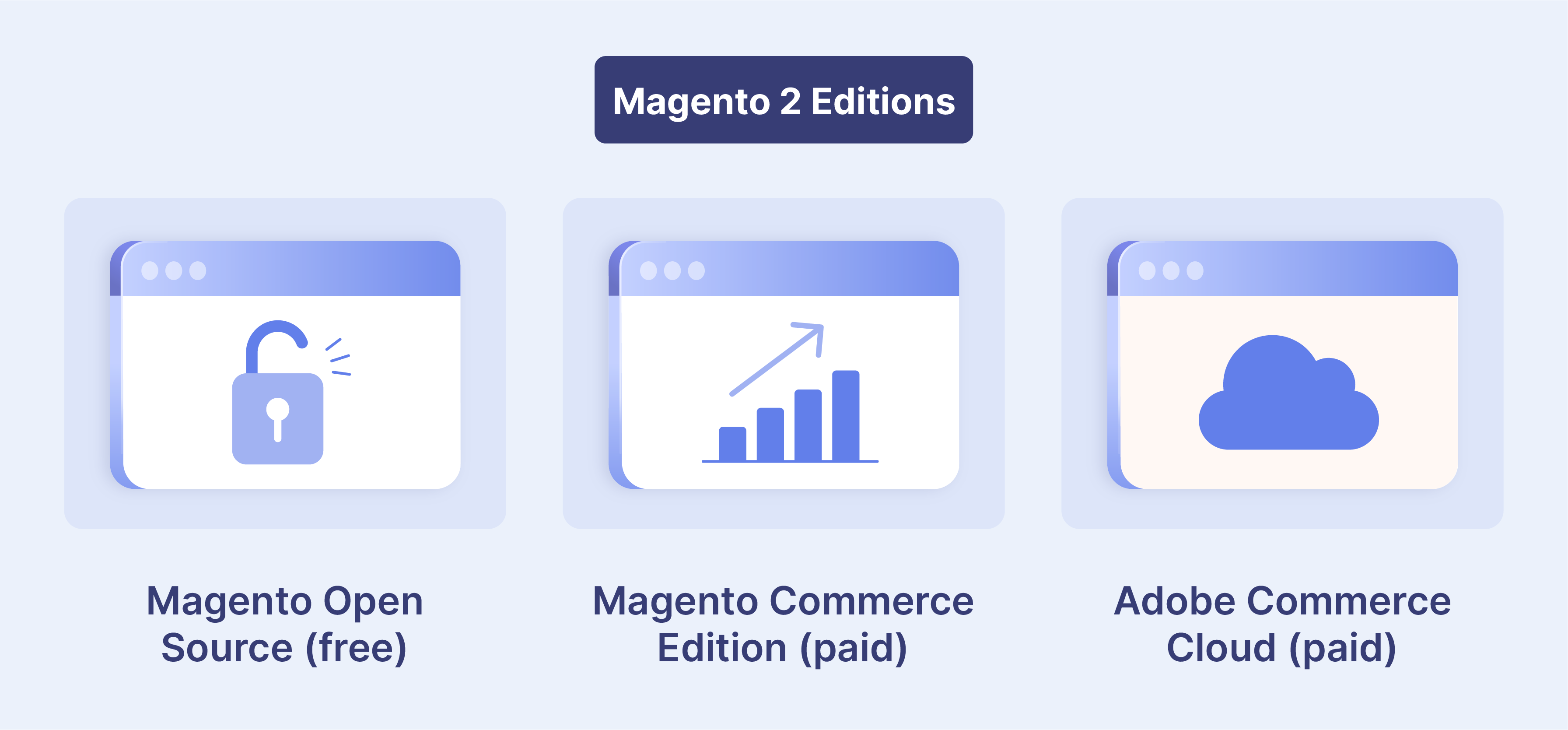
Magento Ecommerce Platform: B2B vs. B2C Ecommerce
Magento ecommerce platform is known for its flexibility, allowing businesses to customize and adapt it to their specific requirements. It provides numerous extensions and themes for both B2B and B2C purposes, enabling the addition of new features and functions to your online store. This guide focuses on distinguishing Magento 2 B2B from B2C ecommerce. It highlights variations in payment processing, customer relationship management, conversion time, and related aspects.
Key Takeaways
-
Explore the Magento e-commerce platform to understand how it enhances the efficiency of your B2B or B2C business.
-
Explore payment processes, inventory management, customer relationships, analytics, and conversion times in Magento 2 for B2B and B2C ecommerce.
-
Discover faster page loads, mobile responsiveness, and simplified checkouts, enhancing user experience.
-
Understand Open Source, Commerce, and Commerce Cloud editions, each catering to specific business needs.
-
Learn about Magento 2's tailored features for B2B catalog management, volume-based pricing, and B2C's improved customer relations and order processing.
-
Compare Magento 2 editions for B2B and B2C, highlighting their unique functionalities.
What is Magento 2?
Magento 2 represents the updated iteration of Magento 1, introducing a range of notable improvements compared to its predecessor.
Magento 1 had its share of security concerns, payment options limitations, and inadequate Magento development support. It also had a steep learning curve, potential performance issues, and lacked features like mobile-friendliness.
Key Enhancements in Magento 2
-
PHP Version Support: Magento 2 supports the latest PHP versions, positively impacting site speed.
-
Modern Technologies: It embraces modern technologies like CSS3, HTML5, and MySQL for enhanced functionality.
-
Faster Page Load Speed: On average, Magento 2 offers a 20% faster page load speed than Magento 1.
-
Mobile Responsiveness: Magento 2 is designed to be mobile responsive, catering to the growing mobile user base.
-
Improved Admin Interface: The admin interface in Magento 2 is more user-friendly, making it easier for non-technical staff to use.
-
Simplified Checkout Process: It simplifies the checkout process, reducing it from six steps in Magento 1 to just two in Magento 2.
Magento 2 Editions

Magento 2 offers three distinct editions, each tailored to different business needs:
1. Magento Open Source
Previously Community Edition, this free version can be freely downloaded from the Magento website. While it provides essential tools and frameworks, users are responsible for hosting, support, and development costs.
2. Magento Commerce
This premium on-premise option offers additional features and enterprise-level support. It is best suited for large businesses with substantial financial resources.
3. Magento Commerce Cloud
Magento Commerce Cloud is the most expensive plan. It includes most features from the Commerce edition and eliminates the need for self-hosting. It's ideal for businesses dealing with substantial data and website traffic.
What is Magento 2 B2B?

Magento 2 B2B ecommerce platform is tailored for businesses seeking to sell products and services to other businesses online. It simplifies Magento catalog management, facilitates volume-based pricing, and automates various aspects of B2B sales.
B2B, short for Business-to-Business, involves the exchange of products or services between companies rather than individual consumers. Unlike B2C (Business-to-Consumer) operations, B2B entities prioritize enhancing customer experiences to establish enduring business partnerships.
Recognizing the unique needs of B2B enterprises, Magento 2 introduces the Magento 2 Commerce and Commerce Cloud Editions, tailored for large organizations and store owners.
What is Magento 2 B2C?

Magento 2 B2C, or Business-to-Consumer, refers to businesses that sell products directly to individual consumers. The B2C customer base is typically larger compared to B2B audiences. The Magento open-source edition specifically offers features for the B2C market, and it's freely available for download and installation.
Magento B2C offers several advantages for businesses, including improved customer relationship management and more effective sales tracking. Furthermore, it automates tasks such as order processing and customer service, leading to time and cost savings for companies.
How Magento Enhances Your Ecommerce Store
Magento, or Adobe Commerce, offers a Content Management System (CMS) for businesses seeking versatile control over their online presence. This platform allows seamless configuration and customization of product catalogs and shopping carts. With built-in SEO features, including SEO-friendly Magento templates, businesses may create custom pages tailored for optimal search engine visibility.
Magento provides ongoing maintenance for those requiring specialized development services or seeking to hire a developer. It also offers SSL certification for secure transactions and support for multiple payment gateways. It aids businesses in catering to customer behavior and repeat purchases by offering personalized product recommendations and segmented product pages.
Magento's flexibility and customization options empower businesses to configure their stores to accept multiple currencies, ensuring a global reach. Magento's segmentation capabilities also enable targeted marketing, influencing customer behavior and enhancing personalized shopping experiences.
Magento ecommerce B2B vs B2C: Key differences
1. Payment Process and Options

Magento B2B ecommerce platform:
Magento B2B offers adaptable sales methods, allowing businesses to customize their sales processes to meet their needs and requirements through Magento's flexible architecture. Custom payment integration features in B2B offer default payment options similar to B2C but include tailored fast checkout and support options. It is customizable to meet the intricate transaction needs of businesses.
Magento B2C ecommerce platform:
Magento B2C relies on uniform, standardized sales, and operational processes across all customer transactions. Magento B2C primarily relies on standard payment options without the same level of customization for complex transactions.
2. Customization

Magento B2B ecommerce platform:
Magento B2B allows businesses to create customized Magento quotations. It is made possible through Magento's configurability and extensions. It ensures their operations are precisely tailored to meet their unique demands.
Magento B2C ecommerce platform:
Magento B2C offers a different level of customization in its sales processes; it follows a more standardized approach.
3. Customer Relationship

Magento B2B ecommerce platform:
B2B businesses often have longer and more complex sales cycles due to products/services intended for extended, high-intensity use. For B2B, building strong relationships with customers and understanding what they need is crucial. It is supported by features such as Magento's customer management tools and advanced customer segmentation.
Magento B2C ecommerce platform:
B2C sales typically involve shorter and less complex decision-making processes. Emotional factors and individual consumer preferences often drive it.
4. Conversion Time

Magento B2B ecommerce platform:
Magento B2B experiences slower buyer conversion times, primarily because of the meticulous development work needed to optimize the Magento user interface for business users.
Magento B2C ecommerce platform:
Conversion times in Magento B2C are quicker as the platform is designed for consumers who may make faster purchase decisions.
5. Purchase Decision

Magento B2B ecommerce platform:
In Magento B2B, purchase decisions are typically straightforward and made by experienced business representatives focused on meeting business needs efficiently. Magento's tools for B2B-specific catalogs and pricing strategies support efficient decision-making.
Magento B2C ecommerce platform:
In Magento's B2C platform, emotional factors frequently influence purchasing decisions. Customers make choices based on their desires and preferences. It is often made without concern about the price or cost associated with their desired products or services.
6. Marketing

Magento B2B ecommerce platform:
Targeted campaigns are achieved through customer segmentation and personalized sales processes. Emphasis on product quality and service excellence facilitated by Magento's content management and marketing tools.
Magento B2C ecommerce platform:
B2C marketing efforts target individual consumers with features like cart abandonment emails and promotions. It highlights Magento product attributes and competitive pricing using Magento's marketing automation and promotion tools.
Difference Between Magento 2 B2B Features & B2C Features
| Comparison | Magento B2B eCommerce | Magento B2C eCommerce |
|---|---|---|
| Market Size | Typically smaller compared to B2C. | Encompasses a broad market with abundant product choices. |
| Customer Base | Smaller, consisting of significant clients with high demands and potential competition. | Wider customer base with greater diversity. |
| Customer Relationship | Emphasizes long-term relationships and mutual benefits. | Variable, as customers have diverse preferences before establishing brand loyalty. |
| Sales Process | Employs highly customizable sales methods. | Adheres to standardized sales and operational processes. |
| Product Price | Offers personalized pricing, quotations, and special deals tailored to individual needs. | Follows standardized pricing with no customer-specific variations. |
| Order Value | Involves high-order values, often accompanied by stringent requirements. | Typically features medium-sized orders with average values lower than B2B orders. |
| Purchase Decision | Decisions are usually made by dedicated teams or business representatives, driven by functional considerations and preferences. | Emotional factors influence personal decision-making. |
| Payment Option | Provides numerous options for faster checkout and support. | Offers a limited set of default Magento payment options. |
| Conversion | Experiences longer conversion times and lower Magento conversion rates. | Tends to have shorter and faster conversions compared to B2B. |
Magento 2 B2B vs. B2C: Platform Comparison
When considering Magento 2 for B2B and B2C businesses, it's evident that the platform offers versatility to cater to both segments. However, the choice of edition and its suitability vary between these two categories.
For B2C Businesses
For enterprises engaged in B2C operations, Magento 2 offers two primary platform options:
1. Open-Source Edition
This edition encompasses all the essential features for conducting B2C activities. It provides a strong foundation for businesses serving individual consumers. It includes:
-
Customizable Storefront: Allows B2C businesses to design and customize their online storefronts to create a unique brand identity.
-
Extensive Extension Marketplace: Allows access to a vast library of third-party extensions and integrations to enhance website functionality and user experience.
-
Responsive Design: Mobile-responsive themes ensure a seamless shopping experience on various devices.
-
SEO-Friendly: Built-in SEO features to optimize product listings and improve search engine visibility.
-
Content Management: Reliable content management system for creating and managing product catalogs, blogs, and landing pages.
2. Commerce Edition
B2C companies can select this or the Commerce Edition based on their specific operational needs and objectives. The Commerce edition provides additional capabilities and features tailored to more advanced B2C requirements.
-
Advanced Marketing and Promotions: Includes features like rule-based product recommendations, targeted promotions, and customer segmentation.
-
Page Builder: A drag-and-drop builder for creating and customizing content-rich pages without coding.
-
Elasticsearch Integration: Powerful search capabilities for improving product search and navigation on the website.
-
Customer Loyalty Programs: Tools for implementing loyalty programs, reward points, and personalized shopping experiences to enhance customer retention.
-
Enhanced Performance and Scalability: Advanced performance optimization and scalability features to handle high traffic and sales volumes.
-
B2C-Specific Features: Tailored features for B2C businesses, such as wish lists, gift registries, and rich media support for product visuals.
2. For B2B Businesses
Magento 2 Commerce emerges as the superior choice for B2B endeavors. It is primarily because of specialized features tailored to the demands of wholesale customers. These features are not available in the Open-Source edition. These features include:
-
Company Account: Magento 2 Commerce permits B2B companies to establish accounts and designate roles. It helps to streamline management processes, particularly in multi-stakeholder scenarios.
-
Shared Catalog: Commerce enables the creation of custom catalogs that can be shared among company members. It also allows for distinct pricing catalogs to be assigned to each company, enhancing pricing flexibility.
-
B2B Quote: The B2B quote feature facilitates B2B customers in requesting quotes, expediting negotiations, and ensuring smoother transactions.
-
Quick Order: Commerce provides a quick order form for B2B customers. It simplifies the order placement process for efficiency.
-
Requisition List: Wholesalers can create requisition lists, simplifying item addition to the cart and facilitating convenient re-purchases for repeat orders.
-
Purchase Orders (PO): Magento 2 Commerce introduces advanced Purchase Order (PO) number issuance. It enables B2B customers to complete transactions effortlessly using their preferred accounts payable systems. It enhances convenience and efficiency in the purchasing process.
FAQs
1. Why should businesses choose the Magento platform over other ecommerce solutions?
Magento is a powerful platform that allows businesses of all sizes to create and manage their online stores efficiently. Unlike other platforms, Magento provides a flexible ecommerce solution with advanced features and support. It's an open-source platform with everything you need, from a user-friendly admin panel to scalable features and functionality. It is a cost-effective choice for diverse business needs.
2. What benefits does Magento 2 offer compared to Magento 1?
Magento has various built-in features and support that significantly improve compared to the earlier version of Magento. It provides enhanced order management, and better Magento SEO features that can help improve your store's visibility on search engines. It also offers advanced tools for seamless integration with third-party systems.
3. How does Magento support businesses in integrating their systems and workflows?
Magento is a platform that allows businesses to integrate with third-party applications and systems easily. It offers seamless integration options for various aspects, including but not limited to payment gateways, ERP systems, CRM solutions, and multiple storefronts. Its modular and highly flexible nature makes integration with complex needs and technical resources relatively straightforward.
4. Is Magento a cost-effective solution for businesses looking to create an online store?
Magento is known for being a cost-effective option due to its open-source nature. It provides businesses with an open-source ecommerce platform with features and functionality. It helps businesses save on development costs by offering various plugins, Magento marketing tools, and customization options without compromising quality or scalability.
5. How does Magento cater to businesses with diverse needs and sizes?
Magento is a scalable and flexible ecommerce platform that allows businesses of all sizes to thrive. From small startups to large enterprises, Magento offers features to help businesses customize their online stores according to their specific requirements. Its highly flexible and customizable nature accommodates various business models, ensuring a seamless customer experience.
Summary
Magento ecommerce platform is an all-around solution for businesses establishing versatile online stores. It offers customizable features and support tailored for diverse business models.
This article covered the distinctions between Magento 2 B2B and B2C ecommerce. It highlights their varied payment processes, customer relationships, and conversion times. It also delved into the available editions and the specific functionalities designed for B2B and B2C businesses.
Looking to enhance the efficiency of your B2B or B2C business? Delve into dependable Magento hosting solutions to guarantee top-notch performance and scalability for your online store.

